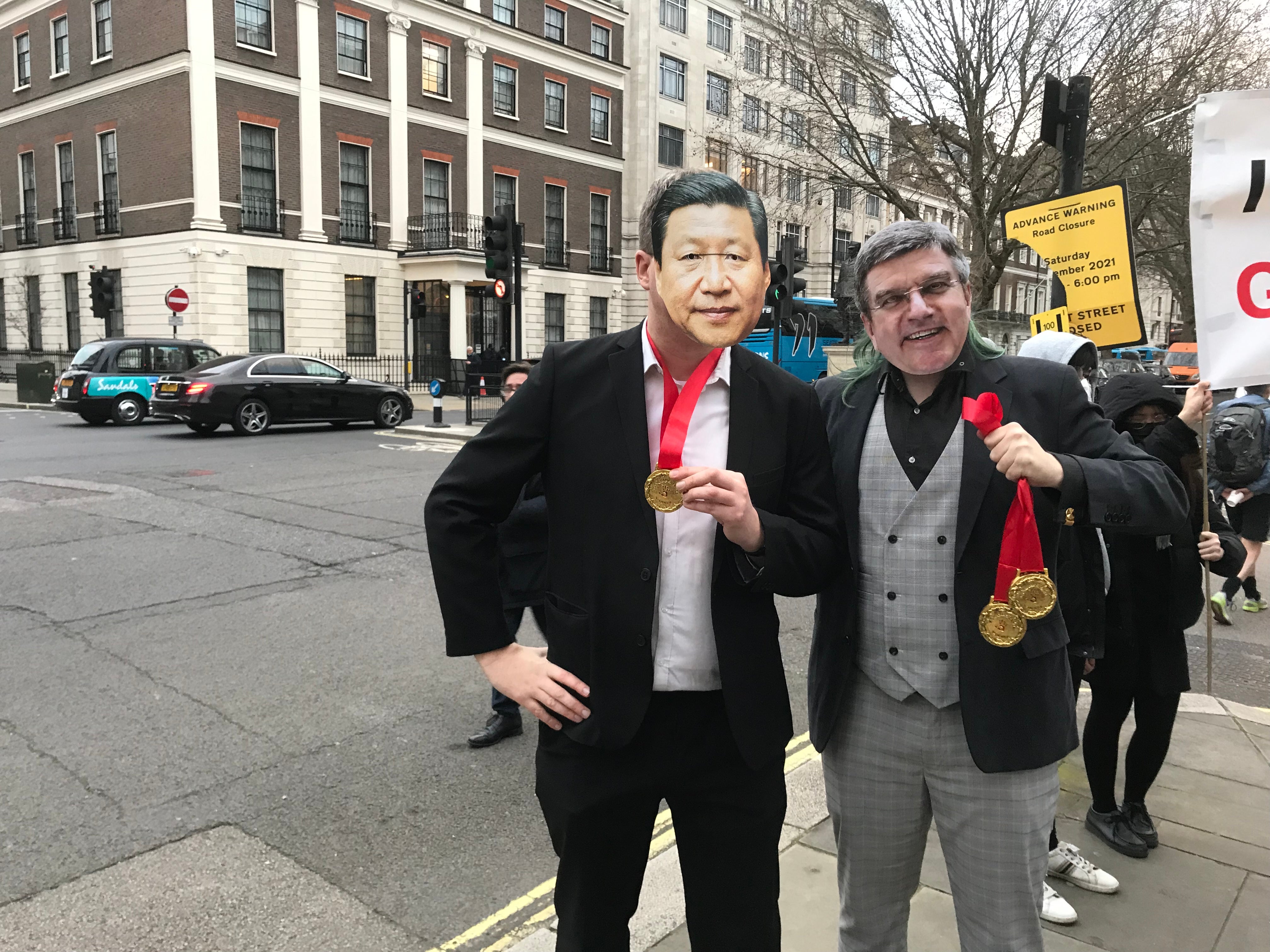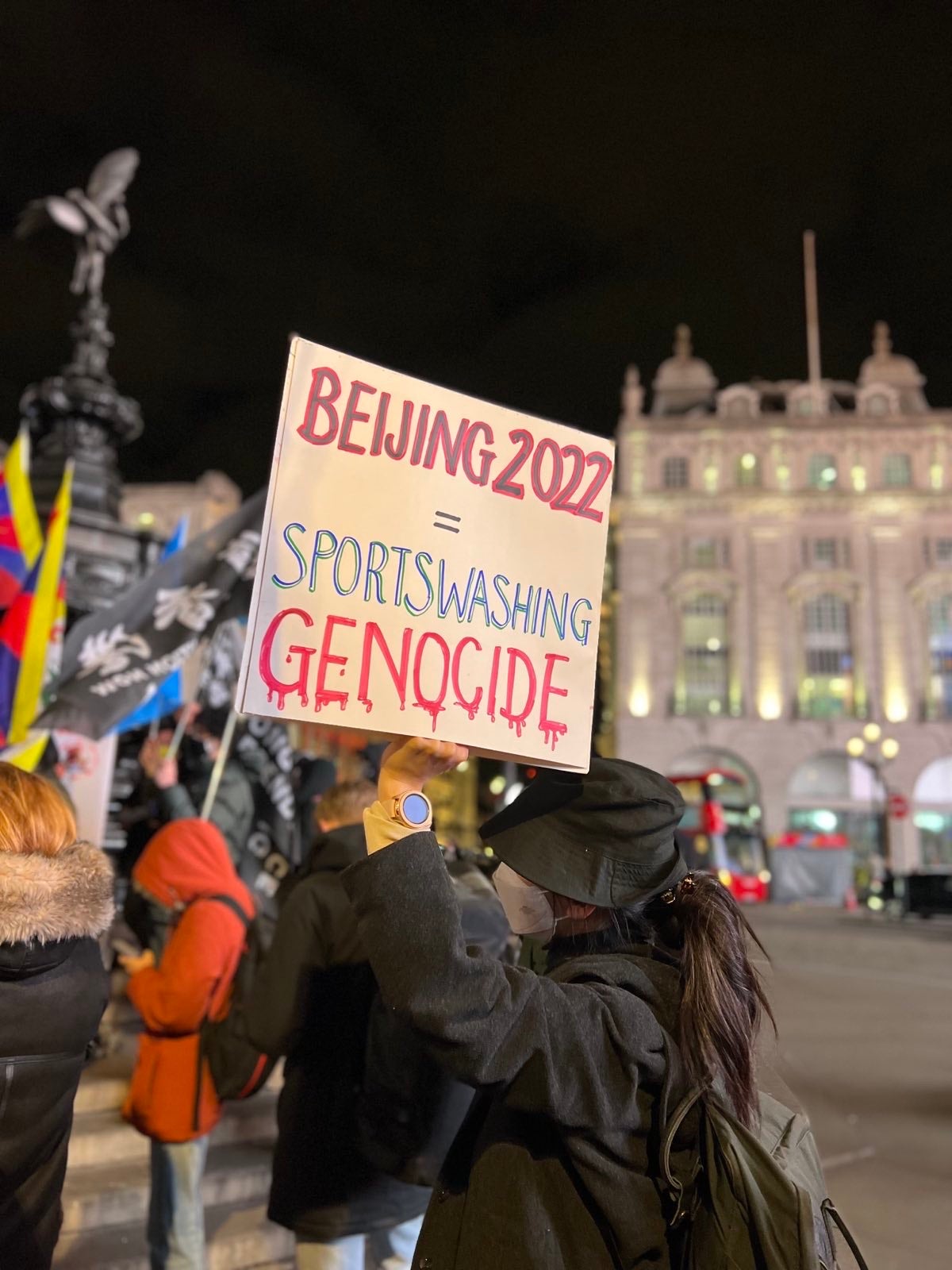Protesters denounce Winter Olympics with mock medals for China’s ‘record-breaking atrocities’
Uyghur, Tibetan and Hong Konger demonstrators in London claim IOC is helping China to ‘sportswash’ global image
Your support helps us to tell the story
From reproductive rights to climate change to Big Tech, The Independent is on the ground when the story is developing. Whether it's investigating the financials of Elon Musk's pro-Trump PAC or producing our latest documentary, 'The A Word', which shines a light on the American women fighting for reproductive rights, we know how important it is to parse out the facts from the messaging.
At such a critical moment in US history, we need reporters on the ground. Your donation allows us to keep sending journalists to speak to both sides of the story.
The Independent is trusted by Americans across the entire political spectrum. And unlike many other quality news outlets, we choose not to lock Americans out of our reporting and analysis with paywalls. We believe quality journalism should be available to everyone, paid for by those who can afford it.
Your support makes all the difference.On the eve of the Winter Olympics opening ceremony in Beijing, an altogether different kind of event took place some 5,000 miles away in London.
There were flags, chants, and even medals. But the comparisons ended there.
Rather than celebrate the start of the Games, the gathering in the British capital – which was billed as an ‘alternative opening ceremony’ – opposed the sporting spectacle.
Hundreds of protesters came together to condemn China’s human rights record and the International Olympic Committee’s (IOC) decision to award the country a second Olympics in just over a decade.
Beneath the brightly lit advertising of London’s Piccadilly Circus, dozens of Uyghurs, Hong Kongers and Tibetans assembled to speak out against the Chinese Communist Party (CCP) for its crackdown against their ways of life.
Under President Xi Jinping, China has detained hundreds of thousands of Uyghurs and other ethnic minorities in Xinjiang province, clamped down on democracy in Hong Kong, and stifled freedom and identity in Tibet.
Just like at the Olympics, flags were flown and anthems were sung at the demonstration in central London. In a grim parody, mock gold medals were also distributed, but for “record-breaking human rights atrocities” instead of athletic prowess.
Protests like the one in London have been unfolding worldwide in recent weeks, with activists and members of the public marching in California, Delhi, and even outside the IOC’s headquarters in Lausanne, Switzerland.
The demonstrators at the event in London, which started outside the Chinese embassy before moving to Piccadilly Circus, claimed the IOC has helped China to clean up its image through sportswashing.
“Given the diverse participation in the Olympic Games, the IOC must remain neutral on all global political issues,” the committee said in response.
Outside the Chinese embassy, Rahima Mahmut, founder of the Stop Uyghur Genocide campaign, had little time for this explanation.
She told The Independent how she and her colleagues had urged the IOC to speak to Uyghurs who had been detained in internment camps by the Chinese government. The request was rejected, with the sports body justifying its actions by saying that sport is neutral and not political.
“How is it not political? How can you give this opportunity to a government that is carrying out genocide?” Ms Mahmut said, in reference to China’s treatment of Uyghurs in Xinjiang.

Countries including the UK, the US and Australia have said the imprisonment of more than a million Uyghurs since 2016 and the forced sterilisation and birth control inflicted on Uyghur women amount to genocide. An independent tribunal in London reached the same conclusion late last year. However, China denies the charge, insisting that it is simply fighting “extremism” in the region.
“China never interferes in other countries’ internal affairs,” the Chinese embassy in London said in a statement last month. “We are also firmly opposed to interferences by anyone in China’s internal affairs.”
Ms Mahmut, who is Uyghur, contrasted the “happy faces and happy celebrations” at the opening ceremony in Beijing with the suffering of her people. Many of their fates are unknown, as the authorities have enforced an information blackout in Xinjiang.
“I myself lost contact with my entire family – sisters and brothers – and my friends. All the people I looked up to were taken away one by one,” she said. “I am watching from afar, but I feel like I am living in that horror.”
Maira Aisa, another Uyghur living in exile, told The Independent the IOC should have consulted governments, lawyers and human rights organisations after the backlash over the 2022 Winter Olympics being staged in China.
“Not taking any action is directly affecting the IOC’s reputation. They could easily have moved the Games to another country,” said Ms Aisa.

Pema Yoko, a leader with Tibetan Community UK, recalled how the IOC allowed Beijing to host the Summer Olympics in 2008 on the condition that it reformed its human rights record.
The campaigner said China’s exploitation of minorities has worsened in the intervening years, including the harsh treatment of Tibetans, whose autonomous state is now ranked as the least free in the world, according to the US organisation Freedom House.
“Nothing that the IOC is doing with these games upholds the Olympic values,” Ms Yoko said.
This view was reiterated by John Jones, who works for the charity Free Tibet. “For the IOC to give another Olympics to Beijing was a real slap in the face for the victims,” he said.
In recent months, led by the US, countries such as Canada, Lithuania, New Zealand and the UK launched a diplomatic boycott of the Beijing Winter Olympics because of alleged human rights violations in China.
The CCP hit back at the move, saying it was motivated by “ideological prejudice” and was based on “lies”.
Benedict Rogers, the director of Hong Kong Watch, said he welcomed the diplomatic boycott. However, he thinks it was “not enough”, suggesting corporate sponsors of the Games should have been targeted too.
The human rights lawyer added: “I think it’s really shameful that the IOC awarded the Games to China, that they didn’t listen to mounting calls for them to relocate it.

“Especially as this is a regime that is now credibly accused of genocide of the Uyghurs, of continuing repression in Tibet, widespread human rights violations across China, and, of course, the dismantling of Hong Kong’s freedoms.”
Mr Rogers called on athletes “to seriously consider speaking out after the Games”, when they return to their countries and it is safe to do so.
Beijing has repeatedly said it opposes the “politicisation” of sports.
“The so-called China human rights issue is a lie made up by people with ulterior motives,” Zhao Weidong, spokesman for the Beijing Games, said on Thursday.
At the London protest, Ivan, who fled Hong Kong years ago after being arrested in pro-democracy protests, recalled being tortured by pro-CCP officials. He alleged he was waterboarded in detention before being released and deciding to leave his homeland.
“Lots of my friends are still in jail in Hong Kong. And I don’t know when I’ll be able to return to my country,” he said.
Veteran Hong Kong activist Koo Sze-yiu was arrested on Friday under a controversial national security law, days after he announced plans to protest the Winter Olympics outside government offices in the city.
Amid chants of “Shame on China” and “IOC, shame on you”, several British politicians gathered beneath a winged statue in Piccadilly to lend their support to the protesters.
Nusrat Ghani, a former Conservative minister, said China was engaged in a “most expensive” PR campaign. “We will not let China off the hook,” she said.
Crossbench peer Lord Alton, who like Ms Ghani was sanctioned by the CCP for speaking out against the treatment of Uyghurs, complained about the IOC’s “appalling degradation of the Olympic spirit” by choosing Beijing as this year’s host city.
“Not since 1936 … have we seen the Games so debased,” he said, referring to when Nazi Germany hosted the Olympics in Berlin.




Join our commenting forum
Join thought-provoking conversations, follow other Independent readers and see their replies
Comments